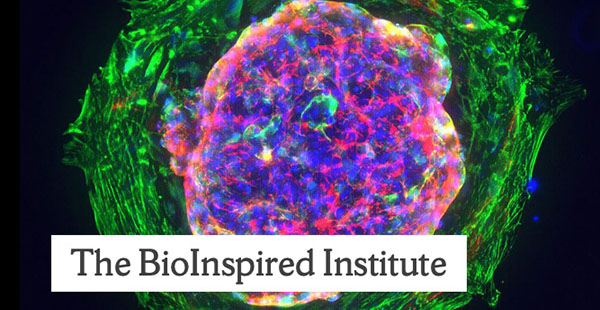Science and Mathematics
MRSEC Brainstorming: Material Scaffolds for Living Organisms
January 17, 2022 at 2:30pm – 5:00pm EST
Virtual (See event details)
This event has already occurred. The information may no longer be valid.

The BioInspired Institute is holding additional brainstorming sessions to start identifying promising sub-projects (often involving 2-4 PIs) that can fit under two proposed Interdisciplinary Research Groups (IRGs). This session will focus on a proposed IRG Material Scaffolds for Living Organisms:
Designing materials that can productively interact (via feedback mechanisms) with living systems, or facilitate specific large-scale gradients or mechanical properties. Applications include advanced manufacturing (e.g. making more efficient biofactories or being able to use new techniques for biofactories facilitated by rationally designed spatial scaffolding), biomaterials (e.g. wound packing materials that respond to bacterial infections), hybrid synthetic materials (e.g. bacteria embedded in polymers that have an interested activated or sensing response, or eukaryotic cells interacting with fiber networks or mechanical metamaterials). Material scaffolding inside the cells: 3D print organelles inside the cells. Potential needs:
- Expertise in organoid systems or spheroid systems or biofilms could be useful here
- Expertise in responsive biomaterials could be important
- Expertise in 3D printing and manufacturing could be important
- Expertise in synthetic biology could be important
The Materials Research Science and Engineering Center (MRSEC) is the major center funding mechanism for the Division of Materials Research (DMR) at NSF. MRSECs must be composed of 2-3 “Interdisciplinary Research Groups” (IRGs).
- Successful MRSECs typically identify 8-10 faculty with major involvement in each IRG (the RFP allows 6-12); these folks often have prior DMR funding.
- An IRG must have a cohesive research theme, and a big component during review is whether the theme is 1) really exciting/driving the field in a new direction and 2) whether it require diverse expertise.
- The focus of the IRG must be materials, in topics funded by DMR. It cannot be focused on other subjects of broader NSF interest (biology, biophysics, information science, etc.)
- Different IRGs must be distinct. There can be synergies, but each IRG is evaluated separately first, and synergies can be in infrastructure, education, etc. and not necessarily in research overlap
This event was published on January 11, 2022.
Event Details
- Category
- Science and Mathematics
- Type
- Workshops
- Region
- Virtual
- Open to
- Faculty
- Group
- BioInspired
- Contact
- Jeremy Steinbacher
jlsteinb@syr.edu
- Accessibility
- Contact Jeremy Steinbacher to request accommodations
